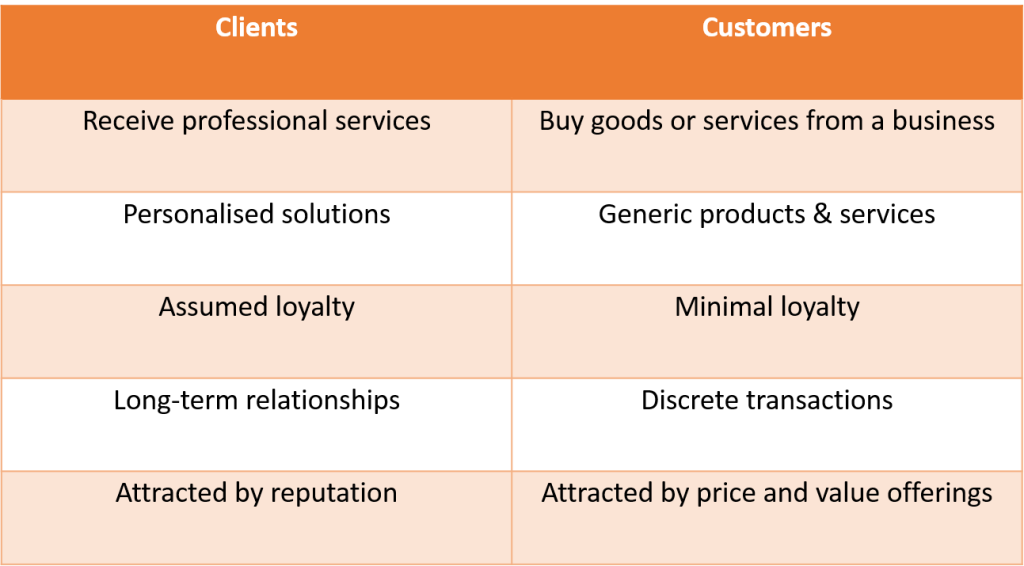
12 Jun Clients, customers – and why the difference matters
Do you have clients or customers?
Traditionally, professionals have been quite keen on emphasising that they have ‘clients’, not ‘customers’ – and with good reason – the term ‘client’ implies that the service being provided is professional, is tailored, that there is loyalty involved and that the client-professional relationship is much deeper than that of a shop and customer.
Indeed, it is frequently assumed that the ‘client’ relationship is inherently superior to the ‘customer’ relationship, and you can still find books, blogs and seminars telling professionals how they can turn customers into clients by demonstrating trusted advisor behaviours and the like.
But does this still apply? Should all professionals still be striving for the ‘client’ relationship, and distancing themselves from mere ‘customers’?
Connecting with customers
The fact is that, increasingly, customers don’t want to become clients:
- they don’t want to be loyal to one solicitor, and will choose different advisors for different issues on a case-by-case basis
- loyalty (in terms of either a vague obligation to, or blind trust in one professional) is fading fast as customers shop around. Customer ‘stickiness’ is the new aim – retaining customers based on the offering of genuinely superior value
- they don’t see the need for ‘tailored’ professional services, and see more and more legal services as commodities that can be purchased as such
- they don’t want long term relationships, and increasingly don’t want any relationship. The thought of a professional wasting an hour of their time so they can ‘understand their needs’ fills them with dread: they want a quick, simple ‘transaction’.
The above doesn’t apply to all customers/clients of course – but it is the trend – and one which solicitors need to do more to respond to. There is no point, for example, in blaming customers for not wanting a deeper ‘client’ relationship.
Some practices can hold out, of course, and target the (shrinking) market that truly values the deeper relationships. Most practices, however, can benefit by adapting their business model and marketing practices to better appeal to customers, rather than clients.
This involves:
- Developing more direct, specific value propositions based on real deliverables that customers will value
- Investing in product development so that core offerings are differentiated from those of competitors
- Developing more flexibility and creativity in engagement and delivery models so as to make the customer experience as quick and easy as possible.
- Offering pricing certainty by moving to fixed fees and value pricing
- Genuinely investing in the customer experience in terms of experience design and process standardisation – and moving beyond an approach that over-relies on the inconsistent relationship-building abilities of individuals.
- Developing marketing and business development strategies based around lower assumptions of repeat ‘clients’.
Register now for my ‘Customer Experience Essentials’ webinar with CPDforme, this Thursday June 16 at 1.00.
For a more in-depth discussion on how to make customer experience a competitive advantage for your practice, register for my half-day workshop ‘Delivering a totally awesome customer experience’ on 13th July.




Sorry, the comment form is closed at this time.